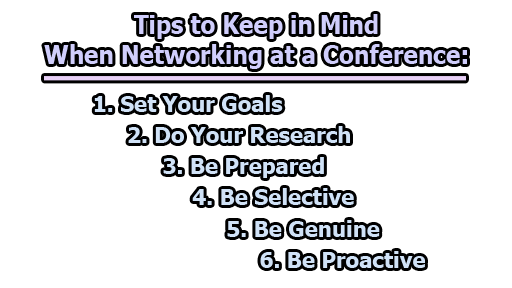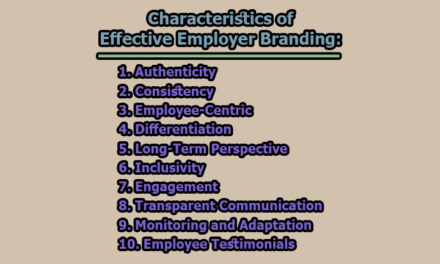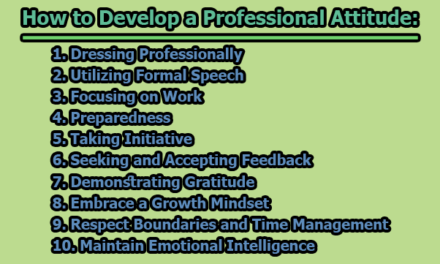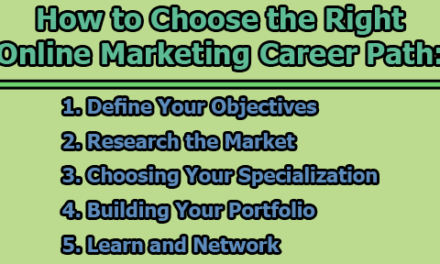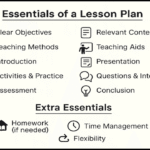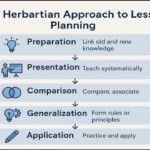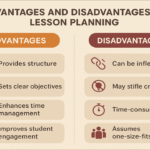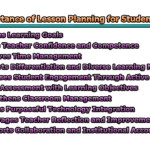Tips to Keep in Mind When Networking at a Conference:
Networking at conferences is a powerful tool for professional growth, and with the right approach, it can open doors to new opportunities, collaborations, and valuable relationships. Whether you’re a seasoned professional or a newcomer to the networking scene, here are some essential tips to keep in mind when networking at a conference.
1. Set Your Goals: Before embarking on a networking journey at a conference, it’s essential to define your objectives. Ask yourself what you hope to achieve – whether it’s expanding your professional network, finding potential clients, seeking mentorship, or learning from industry experts. By having clear and realistic goals, you can strategically channel your efforts, prioritize contacts, and evaluate your success.
For instance, if your goal is to meet potential clients, you can tailor your approach to focus on networking events and sessions relevant to your target audience. On the other hand, if your aim is to learn from experts, you might prioritize attending keynote speeches, panel discussions, or workshops hosted by industry leaders.
Setting specific goals not only provides direction but also allows you to measure the impact of your networking efforts. It helps you make the most of your time at the conference by ensuring that each interaction aligns with your overarching objectives.
2. Do Your Research: Once you’ve established your goals, the next crucial step is thorough research. Dive into the conference agenda, familiarize yourself with the speakers, attendees, and sponsors. This knowledge will empower you to make informed decisions about where to invest your time and energy.
Leverage various resources for research, such as social media platforms, official conference websites, and personal connections. LinkedIn, in particular, can be a goldmine for gathering information about professionals attending the conference. Understanding the backgrounds, interests, and roles of potential contacts allows you to approach conversations with relevance and depth.
Imagine discovering that a speaker at the conference shares a common interest or background with you. Armed with this information, you can initiate a conversation with a specific question or comment, instantly creating a more meaningful connection. Research not only facilitates better networking but also showcases your dedication and genuine interest in building relationships.
3. Be Prepared: Preparation is the linchpin of successful networking. Beyond researching the conference and its participants, equip yourself with practical tools and strategies. Ensure you have a professional and updated business card, a succinct and compelling elevator pitch, and a positive, approachable body language.
A well-crafted elevator pitch is particularly important. It should encapsulate who you are, what you do, and what you’re looking to achieve, all in a brief and engaging manner. This serves as an introduction that can spark further conversation and interest from those you meet.
Moreover, anticipate the need for a follow-up plan. Whether it’s a notebook, a dedicated app, or a CRM system, having a way to organize and recall key contacts is crucial. Plan how you will follow up after the conference, whether through email, LinkedIn, or other means.
Being prepared not only instills confidence in your approach but also ensures you make the most of every networking opportunity that comes your way.
4. Be Selective: In the bustling environment of a conference, it’s tempting to try and connect with as many people as possible. However, quality should always take precedence over quantity in networking. Being selective about the individuals you engage with and the sessions you attend allows you to forge deeper and more meaningful connections.
Consider your goals and interests when deciding whom to approach. Instead of spreading yourself thin by trying to interact with everyone, focus on the contacts and events that align most closely with your professional objectives. This approach not only conserves your time and energy but also ensures that the connections you make are more likely to be valuable in the long run.
By being discerning, you elevate the quality of your interactions. It’s not about collecting business cards; it’s about establishing relationships that could potentially lead to collaborations, mentorships, or future opportunities. Quality networking often involves investing more time in fewer connections, resulting in a more substantial impact on your professional network.
5. Be Genuine: Authenticity is the currency of successful networking. While it’s essential to present your professional self, it’s equally important to showcase your personality, passion, and purpose. Networking is not just about exchanging business information; it’s about building genuine relationships founded on trust.
During conversations, let your true self shine through. Share your experiences, aspirations, and even challenges in a sincere manner. Genuine connections are built on authenticity, and people are more likely to engage with you if they feel you are being real and not merely projecting a polished image.
Active listening is a crucial aspect of genuineness. Instead of solely focusing on what you want to convey, take the time to understand others’ perspectives and respond thoughtfully. Expressing genuine interest in others fosters a more meaningful and reciprocal connection, laying the groundwork for potential collaboration or mutual support in the future.
6. Be Proactive: Networking is not a passive activity – it requires initiative and action. Waiting for others to approach you can limit your opportunities. To make the most of your conference networking experience, be proactive. Take the first step by introducing yourself, engaging in conversations, and actively participating in networking events.
Initiating discussions can be as simple as approaching someone during a break, joining a group discussion, or asking questions during a session. By being proactive, you demonstrate your eagerness to connect and your commitment to making the most of the networking opportunities available.
Overcoming any fears or hesitations about reaching out is crucial. Remember that many attendees are likely in the same boat, and your proactive approach can set you apart. Be willing to step out of your comfort zone, offer assistance where you can, and follow up on promising connections promptly.
Networking is a dynamic process, and being proactive ensures that you don’t miss out on valuable connections and opportunities during the conference.
In conclusion, mastering the art of conference networking involves a combination of soft skills, relationship building, and strategic planning. By setting clear goals, conducting thorough research, being prepared, selective, genuine, and proactive, you can maximize your networking potential and turn conference connections into meaningful, long-lasting professional relationships. Remember, the power of effective networking lies not just in what you gain but in what you contribute to the professional community.

Assistant Teacher at Zinzira Pir Mohammad Pilot School and College

